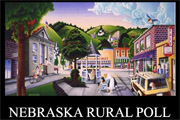Agricultural Economics, Department of

Nebraska Rural Poll
Date of this Version
2013
Document Type
Report
Citation
Nebraska Rural Poll, Research Report (July 2013) 13-3, 23 pages
Institute of Agriculture and Natural Resources, University of Nebraska-Lincoln
Also available at https://ruralpoll.unl.edu/pdf/13taxes.pdf
Abstract
Most rural Nebraskans seem content with current levels of spending on many public services and activities. Over one-half propose no changes in the level of spending for most of the public services listed. Only one item, unemployment compensation, had a majority say they would like to see less spending for it. And, many rural Nebraskans would propose an increase in spending for education as well as roads and bridges.
Not surprising, many groups favor an increase in spending on items important to them. Younger persons are more likely than older persons to favor an increase in spending for education. Persons with lower incomes are more likely than persons with higher incomes to support increased spending for medical assistance to the poor. And, persons with agriculture occupations are more likely to support an increase in spending for roads and bridges.
When asked how they would fund five major expenditures, rural Nebraskans are mixed in their preferences of funding sources. Many rural Nebraskans propose using income taxes, sales tax and property taxes to fund primary/secondary education, public safety and roads and bridges. Many rural Nebraskans propose user fees fund higher education. And, two in ten rural Nebraskans say no public funds should be used for higher education. Many rural Nebraskans have no opinion on funding sources for medical assistance to the poor. Just over two in ten rural Nebraskans say no public funds should be used for medical assistance to the poor. Younger persons are more likely than older persons to say no public funds should be used for medical assistance to the poor.
Included in
Agribusiness Commons, Agricultural and Resource Economics Commons, Civic and Community Engagement Commons, Community-Based Research Commons, Demography, Population, and Ecology Commons, Entrepreneurial and Small Business Operations Commons, Place and Environment Commons, Public Affairs, Public Policy and Public Administration Commons, Regional Economics Commons, Rural Sociology Commons

